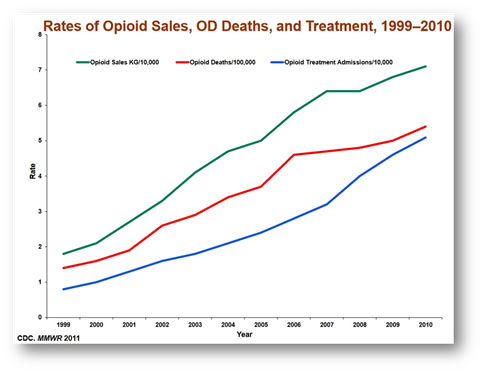UPDATE 9/16/2019: Purdue Pharma, the maker of the blockbuster opioid drug, OxyContin, just filed for Chapter 11 bankruptcy protection late September 15, 2019. To see how you can take a stand and be heard in the Purdue bankruptcy read below. It’s time for you to hire skilled lawyers who are committed to taking down Purdue.
The Time Has Come to Join the Fight Against Opioid Sellers
The Opioid Crisis has claimed the lives of over 400,000 Americans, almost as many Americans as were killed during World War II. The similarities don’t stop there. Like WWII, the Opioid Crisis is an existential threat to the American way of life. It has impacted families in a way that is blind to status, race, religion, gender, sexual orientation, age, or any other classification. It has ravaged communities, large and small. And, if you’re reading this, you probably already know this because it has impacted you or a loved one in a profound way.
The time to stand by has ended. Join the fight of individual victims of the Opioid Crisis to make the pharmaceutical industry pay for what they did. It’s time for real change, change that only comes by force, because the industry will never change unless we force them to. The lawyers at Andrews & Thornton are here for you and your family to take on the pharmaceutical industry.
Call us today at (888) 335-1886 or e-mail us at oxy@andrewsthornton.com.
The Time is Now
Historically, opioids were considered too addictive and debilitating for the treatment of chronic pain such as back pain, migraines, and arthritis. Opioids also tend to induce tolerance, whereby a person who uses opioids repeatedly over time no longer responds to the drug as strongly as before, thus requiring a higher dose to achieve the same effect. Before the 1990s, generally accepted standards of medical practice dictated that opioids should only be used short-term for acute pain, pain relating to recovery from surgery, or for cancer or palliative (end-of-life) care. As a result, doctors generally did not prescribe opioids for chronic pain.
The market for chronic pain patients, however, was much larger than acute pain patients. To take advantage of it, the industry had to change doctors’ general reluctance to prescribe opioids for chronic pain. Opioid sellers engaged in conduct that directly caused doctors to prescribe skyrocketing amounts of opioids. Opioid sellers intentionally neglected their obligations to prevent diversion of the highly addictive substance.
As a result, the number of opioid prescriptions increased sharply, reaching nearly 250 million prescriptions in 2013, which was almost enough for every person in the United States to have a bottle of pills. This represents an increase of 300% since 1999. The carnage resulting from this callous disregard for the safety of Americans is staggering:
- 1/4 Americans receiving long-term opioid therapy struggles with opioid addiction
- Nearly 2 million Americans have a prescription opioid use disorder
- 80 percent of people who use heroin first used prescription opioids
- Drug overdose deaths among all Americans increased more than 200 percent between 1999 and 2015
- Deaths from prescription opioids have quadrupled in the past 20 years
The Opioid Crisis is a serious national crisis that affects public health as well as social and economic welfare. The economic burden of the Opioid Crisis is $78.5 billion a year, including the costs of healthcare, lost productivity, addiction treatment, and criminal justice expenditures.
The time has come to stop the Opioid Crisis. The only way to do it is to fight the corrupt industry that created, prolonged and exacerbated the Opioid Crisis.
You Need Lawyers Who Understand You
If you’re reading this page you have no doubt heard the intense media attention on existing litigation being waged against the pharmaceutical industry for creating the Opioid Crisis. What you may not have realized until now is that most of that fight is being waged by public entities. You need lawyers who work directly for you, the victim.
Andrews & Thornton is representing individual victims and their families for all that opioids have done to shatter families. Whether it’s
- Addiction
- Rehabilitation
- Death
- Overdose
- Divorce or loss of a relationship
- Loss of custody of children
- Loss of homes
- Loss of jobs, or
- All of the above,
Let us help you.
Purdue’s Bankruptcy
Purdue Pharma and its owners, the Sackler family, played a particularly nasty role in creating the Opioid Crisis. Purdue manufactures, promotes, sells, and distributes opioids such as OxyContin, MS Contin, Dilaudid/Dilaudid HP, Butrans, Hysingla ER, and Targiniq ER. When OxyContin was approved in 1995, the FDA allowed Purdue to claim that OxyContin “was believed to reduce” abuse potential because it was long-acting. Not to be deterred by the limitation required by FDA for OxyContin’s marketing, Purdue celebrated the launch of the drug, boasting that it would be “followed by a blizzard of prescriptions that will bury the competition. The prescription blizzard will be so deep, dense, and white.”
Purdue lived up to every word of that forecast. It marketed OxyContin to doctors and patients as being less addictive than other opioids, a claim without any scientific merit. The marketing worked more than Purdue could ever have imagined. OxyContin is Purdue’s best-selling opioid. Since 2009, Purdue’s annual sales of OxyContin have fluctuated between $2.47 billion and $2.99 billion, up four-fold from its 2006 sales of $800 million. OxyContin constitutes roughly 30% of the entire market for analgesic drugs (painkillers).
But the end is near for Purdue. It just filed for bankruptcy on September 15, 2019. In preparation for its inevitable bankruptcy, Purdue attempted to settle with certain public entities on the cheap. The settlement allows the Sacklers, the controlling family of Purdue, to keep billions of dollars of profits currently believed to be hidden in offshore accounts. It does not provide for individual victims. No one has asked the individuals and families directly destroyed by the Opioid Crisis what they need to be made whole, or what they want out of Purdue to make sure a crisis like this never happens again.
But you can be heard. Hire Andrews & Thornton to represent you in the bankruptcy on a contingency rate: we only get paid if we get you money. In the bankruptcy you have a voice. Every victim will get a vote to approve the plan of reorganization. Purdue cannot ignore you if you make a claim in the bankruptcy.
Our Unique Experience and Qualifications
But we have an even more unique experience. Anne Andrews, the managing partner of Andrews & Thornton, has considerable experience navigating bankruptcies involving complicated pharmaceutical claims. She served on official committees in TwinLab and N.V.E., both dietary supplements companies responsible for causing serious injuries to consumers, and as the Chair of the Official Committee of Unsecured Creditors in New England Compounding Pharmacy, a company responsible for distributing compounded steroid injections that caused fungal meningitis. She also participated in bankruptcy proceedings on behalf of tort creditors in Chemtura (who sold a chemical in flavored popcorn causing severe lung injury), Metabolife and MuscleTech (also dietary supplements companies causing users severe injuries like heart attack or stroke), and Dow Corning (which marketed faulty breast implants). Most recently she has served on the Tort Claimants’ Committee in PG&E, a bankruptcy involving tens of thousands of people losing their homes or lives due to PG&E’s electrical equipment. Finally, and most importantly, she current serves as the Chair of the Insys Bankruptcy, the first opioid seller to declare bankruptcy. Anne is helping to shape how these companies pay individuals as we speak.
The bankruptcy of Purdue demands you have lawyers who are not only experienced in litigating complex pharmaceutical cases but also ones who have experience getting those claims paid in bankruptcies.









